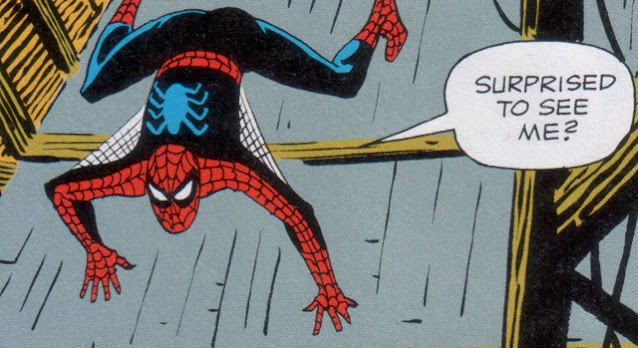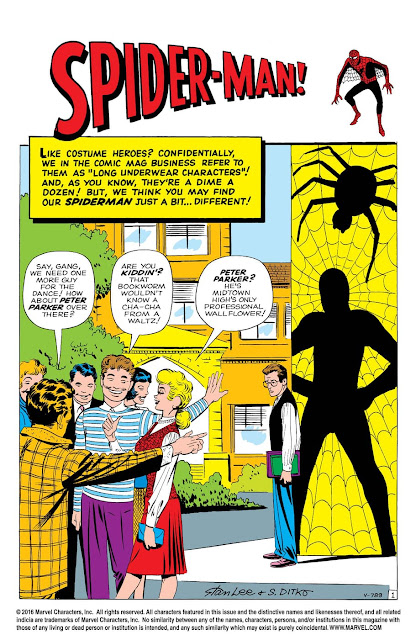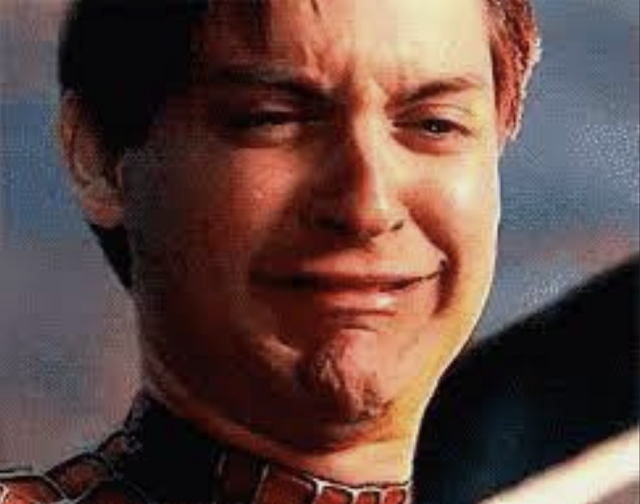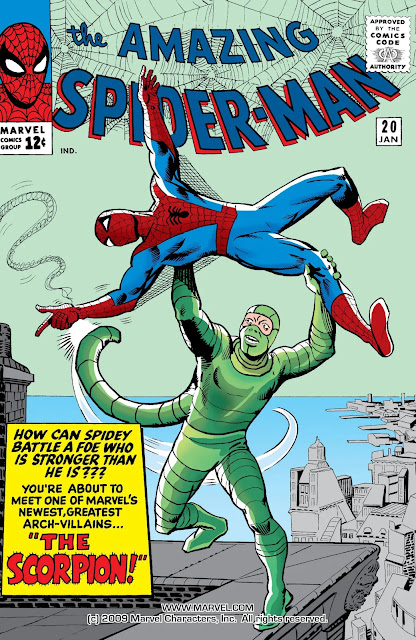Well, aren't Spider-Man fans in a tizzy lately?
I noticed this only because nearly every comic book vlogger seems to have simultaneously lost their cool--
perhaps I need a better phrase--
lost their minds over What They've Done to Poor Peter Parker Lately.
They, currently, is comparatively new writer Zeb Wells. He gave Spider-Man a new status quo that started with a bang. Actually, it started in mediās rēs, with that bang as the mysterious background incident behind the status quo. I read the first handful of issues and, frankly, was very impressed.
 |
| I bet you didn't see that one coming. |
You read that right. Not impressed with the new status quo per se -- I couldn't care less about Spider-Man's love life -- but impressed with how well it was written. Spider-Man was an interesting, if flawed character. His villains were multidimensional, his world interconnected and coherent, the supporting characters realistic and independent in their motivations. Wells work did a very good job of handling a situation that often trips up DC writers; he seemed to understand how created situations that emphasized, yes, having superpowers is cool, but it doesn't in fact solve every problem or most problems or ... any problem, really. YOU do that. Or not. And that's a really great place for Spider-Man to be, narratively.
 |
| Psst. No one ever called them "long underwear characters". |
In fact, that's where Spider-Man STARTED. Stan Lee And Company knew what they were doing when they created Spider-Man and that's exactly the point they were trying to make with the character. That tack (and other similar ones) is part of what helped Marvel distinguish itself from its Distinguished Competition, as they used to call it. It was part of Marvel's niche, its competitive advantage. Spider-Man was a superhero who powers not only didn't solve his personal problems, they aggravated them. The Fantastic Four were a dysfunctional family (if you ask me). Thor was a god, but hobbled (literally) by forced incarnation as a crippled man. The Hulk's superpowers came at the price of a loss of self-control. You get the idea.
 |
| And what lesson did we learn from this today, Pter? |
Or, at least, if you do, you're ahead of many contemporary Marvel fans, it seems. They are currently rioting about the same thing they ALWAYS rioting about with Spider-Man, every time this happens:
Why does Marvel hate Peter Parker? Why won't Marvel let Peter Parker be happy?
 |
| Honestly, it would be funny if it weren't so sad. |
There's zero mystery. Peter Parker wasn't designed to Be Happy. It is not his literary function and never has been. Honestly, I say --and praising Marvel isn't something I do unthinkingly-- good on Marvel for now, as always, making the point that: being good doesn't ensure that you will be rewarded. It's an important message. You do good because it is right to do so and there is moral satisfaction in that, but riches and (a beautiful movie actress's or even just the public's) love do not logically follow. THAT HAS ALWAYS BEEN THE POINT OF SPIDER-MAN. It's a difficult, very adult message to try to convey, especially to the original audience of children. But Marvel took that hill and held it.
Thanks to Zeb Wells, they still are. There are lot of Spider-Fans who identify enough with Peter Parker, however, that they are incensed when he doesn't do well and accuse Marvel of "abandoning the character's development."
Ahem, how does one put it politely? No ****, Sherlock.
There are a lot of artforms you can seek out if you want Character Development, but expecting it (at least on a permanent basis) for IP that spits out monthly stories for five plus decades is disingenuous. Nobody wants to see THEIR version of Spider-Man (or Power Girl or whoever your fixation is) set back to a starting place, having, as a reader, stuck with them through all their struggles and watched them slowly start to get their lives together and get ahead. But comic book icons don't have character arcs; they have persona cycles. Eventually the arc will bend 'round again.
Meanwhile, yes, YOUR version of Peter Parker has had the rug pulled out from under him again. Well, if you want sappy, overly-optimistic comic books, where heroes suffer potentially debilitating tragedies (such as the destruction of their home planet or witnessing the murder of their parents or of being an apparently-totally-straight woman growing up on isolated island with nothing but other women) but still go on to live happy, successful lives anyway, where the public loves them and they have satisfying romantic involvements and perhaps build families ... there's a company that publishes those. You're the one who picked the company that boldly made the tough decision to a harder, less pleasant message with their characters.
 |
| "You knew I was a scorpion when you agreed to let me ride on your back. It's in my nature." |
Spider-Man isn't designed to be happy and stay married to a super-model. No matter how long it's allowed to go on, it's just a fanfic fever dream, but which the character and the company inevitably wake up from.

3 comments:
Solid points all.
I think a lot of the frustration with Peter Parker is when he's written not only as unhappy, but immature. Like, it's one thing for him to be stuck on an eternal treadmill of just trying to make it to payday because he refuses to use his powers to make his life easy; but then he's also written like a teenager in an adult's body, who's terrified of asking out his Catwoman clone (and I'm pretty sure that, for 35 years now, the two of them have been perfectly open about their mutual attraction).
There's room for advancement in Peter Parker's world, but it won't change anything. Give him a better job or more money; he still wrecks his life because there's a world that needs Spider-Man more than it needs Peter Parker. And honestly, that's admirable, if unenviable.
The one thing I can't get over is, Spidey pulls his punches even if he's up against people trying to kill him. He's so committed to not killing, he doesn't take villains down hard enough that they don't get up again without 18 months of physical therapy. Honestly, that starts straining credibility for me: you can keep it non-lethal while still putting villains in a world of pain and dysfunction. Let's see how much rampaging Electro can do with a broken arm.
- HJF1
HJF1- In the ‘80s, Black Cat was attracted to Spider-Man the risk-taking super-hero, but found Peter Parker completely uninteresting. I actually don’t put the dysfunction in their relationship entirely at Peter’s feet.
In terms of what readers want from Spider-Man comics, I think it boils down to a) fun super-hero content (fights & quips), b) problems that are solvable before the next set of problems begin, and c) Peter Parker winning (getting money for photos) when Spider-Man loses (bad publicity) and vice-versa (Spider-Man is publicly lauded for stopping the Green Goblin, but Aunt May ends up in the hospital due to falling debris from the battle).
I like Zeb Wells’s work on X-Men spin-offs (his run on New Mutants and Hellions were excellent), and have read maybe 3 issues of his Spider-Man run. I think the drawn-put mystery of what happened to make Spider-Man AND Peter hated hasn’t worked, and the tone of the comic has been sour. I don’t have a horse in the race, but I think those elements have been the biggest problems for Spider-Man fans. I don’t follow social media opinions, however, so it could easily just be man-babies crying.
- Mike Loughlin
I've read your blog for a long time (from the start) and though you make fun of, ridicule, and joke about Marvel, you never said you HATED it. It just isn't what you're looking for in a comic. So the fact that you are praising Marvel for doing What They Usually Do isn't a huge surprise.
Post a Comment